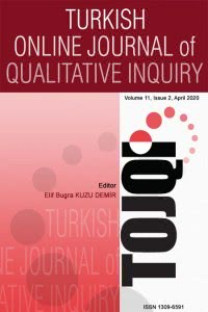Developing Action Research for Developing Teachers in Kosovo
Bu araştırma, öğrenci öğretmenlerin araştırmacı rollerini algılamalarını ve profesyonel gelişimlerinde eylem araştırmaların etkisini incelemektedir. Araştırma, Priştine Üniversitesi Eğitim Fakültesinde yüksek lisans düzeyinde olan öğrenci öğretmenleri kapsamaktadır. Öğrenciler tarafından yapılan yansıtıcı yazılar, açık uçlu soru formları ve araştırma raporlarından toplanan nitel veriler tümevarım yöntemi aracılığıyla incelenmiştir. Araştırma, öğretmen araştırmalarının, sadece öğretim uygulamalarının geliştirilmesine ve öğrenci başarısının yükseltilmesine değil, aynı zamanda yaşıtlar arası işbirliğini arttırma ve öğretmenlerin sınıfı dönüştürme aracı olarak kendi sınıflarında eylem araştırmasını uygulama sorumluluğunu yeni bir kültür olarak teşvik etmeye önemli bir etkisinin olduğunu ortaya koymaktadır. Bu konuda öğretmen eğitimi ve okul bağlamı çok önemlidir ve öğretmen araştırmalarının yalıtılmış bir etkinlik olarak görülmesini önler.
Kosova daki Öğretmenlerin Gelişimi İçin Eylem Araştırması Geliştirilmesi
This study explores the perception of student teachers on their role as researchers and the impact of action research in their professional development. The study involves the master level student teachers of the Faculty of Education at the University of Prishtina in Kosovo. Qualitative data collected through reflective writing, open-ended questionnaires and research reports developed by student teachers were analyzed through the inductive method. The study suggests that teacher research has a major impact not only on the improvement of teaching practices and increasing student achievement, but also on increasing the collaboration among peers and fostering a new culture where teachers assume their responsibilities to apply action research in their own classrooms as a tool for classroom transformation. Teacher education and school context are crucial in this matter and the need arises to avoid viewing the development of teacher research as an isolated activity.
___
- Bogdan, R., & Biklen, K.S. (2007). Qualitative research f or education: An introduction to theories and methods (5th ed). Pearson Education.
- Briggs, J. A., & Coleman, M. (2007). Research methods in educational leadership and management (2nd ed). SAGE Publications Ltd .
- Cain, T., & Milovic, S. (2010). Action Research as a tool of professional development of advisers and teachers in Croatia. European Journal of Teacher Education, 33(1), 19-30.
- Cohen, L., Manion, L., & Morrison, K. (2011). Research methods in education (7th edition). New York: Routledge.
- Cohran-Smith, M., & Lytle, S.L. (1993). Inside outside: Teacher research and knowledge. New York: Teacher College Press.
- Commission of the European Communities. (2005). The Common European principles f or teacher competences and qualif ications. Geneva: Commission of the European Communities (4).
- Darling-Hammond, L. (2000). Reforming teacher preparation and licensing: Debating the evidence. Teachers College Record, 102(1), 2856.
- Dewey, J. (1929). The sources of a science of education. New York: Liveright.
- Fraenkel, R. J., Wallen, E. N., & Hyun, H. H. (2012). How to design and evaluate research in education. McGraw- Hill Companies Inc.
- Harford, J. (2010).Teacher education policy in Ireland and the challenges of the twenty-first century. European Journal of Teacher Education, 33(4), 349-360.
- Hopkins, D. (1985). A teacher guide to classroom research. Open University press, England.
- Johnson, P. A. (2008). A short guide to action research. Pearson Education Inc. Koshy, V. (2010). Action Research f or improving Educational Practice. Sage Publications.
- Lin, E., Wang, J., Spalding, E., Cari, K., & Odell, S.J. (2011). Toward Strengthening the Preparation of Teacher Educator-Researchers in Doctoral Programs and Beyond. Journal of Teacher Education, 62(3).
- McNiff, J. (1997). Action research f or prof essional development: Concise advice f or new action researchers. Retrieved from www.jeanmcniff.com/booklet1.html.
- Megowan, C. (2010). Inside out: Action research from teacher-researcher perspective. J. Sci. Teacher Education, 21, 993 -1011.
- Miller, B.M., Greenwood, D., & Maguire, P. (2003). Why Action Research? Action Research, 1(1), 928.
- Miller, D.M., & Pine, G.J. (1990). Advancing professional inquiry for educational improvement through action research. Journal of Staff Development, 2(3), 5661.
- Wilson, E. (Ed.) (2009). School-based research; a guide f or education students. Sage Publications.
- Oakes, J., & Lipton, M. (2003). Teaching to change the world (2nd ed). New York: McGraw Hill Companies Inc.
- Patton, Q. M. (2002). Qualitative research & evaluation methods (3rd ed.). Sage Publication Inc.
- Programet Master në Fakultetin e Edukimit Mësimdhënia dhe Kurrikula, Udhëheqja në Arsim (Master Programs in Education at the University of Prishtinas Faculty of Education) (2010). Prishtinë: Universiteti i Prishtinës.
- Sagor, R. (2010). Collaborative Action research f or prof essional learning communities. Solution Tree Press.
- Stein, M. K., Smith, S. M., & Silver, A. E. (1999). The development of professional developers: Learning to assist teachers in new settings in new ways. Harvard Educational Review, 69(3), 237-269.
- Stringer, E. (2004). Action research in education. Pearson Education Inc.
- Vula, E., & Bërdynaj , L. (2011). Collaborative Action Research: Teaching of Multiplication and Division in the Second Grade of Primary School. Turkish Online Journal of Qualitative Inquiry, 2(2).
- Zeichner, M. K. (2003). Teacher research as professional development P12 educators in the USA. Educational Action Research, 11(2).
- White, C.S., Fox, R., & Isenberg, P. J. (2011). Investigating teachers professional learning in an advanced Masters degree programme. European Journal of Teacher Education, 34(4), 387405.
- Whitcomb, J., Borko, H., & Liston D. (2009). Promising professional development models and practices. Journal of Teacher Education, 60(3), 20712.
- ISSN: 1309-6591
- Başlangıç: 2010
- Yayıncı: Prof.Dr. Abdullah Kuzu
Sayıdaki Diğer Makaleler
Developing Action Research for Developing Teachers in Kosovo
Language Learning as Chaos/Complexity System: Evidence Based on Iranian EFL Learners' Backgrounds
Language Learning as Chaos/Complexity System: Evidence Based on Iranian EFL Learners' Backgrounds
